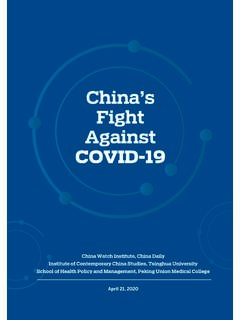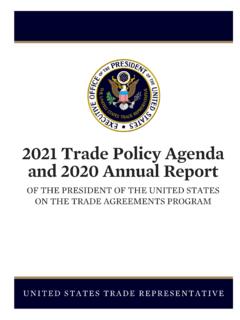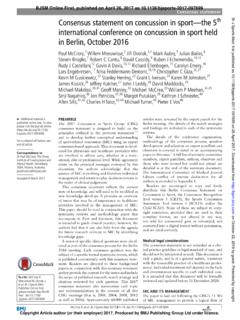Transcription of The Past, Present, and Future of Russia’s Cyber Strategy ...
1 129 The past , present , and Future of russia s Cyber Strategy and ForcesAbstract: Russian cyberattacks against military and civilian infrastructure in the West have become a persistent challenge. Despite the importance of this topic and the excellent scholarship already published on these issues, there is a need for more detailed data and analysis on the role of cyberattacks in russia s security Strategy and its reflection in the evolution of russia s Cyber forces. A better understanding of russia s Strategy and Cyber actors, particularly the growing role of the military in these issues, can facilitate an improvement in Western governments policies to defend against Future Russian activity. To address this issue, this article will outline the role of information and Cyber operations in russia s information warfare doctrine and will analyze the recruitment efforts and modus operandi of russia s Cyber departments, particularly psychological and Cyber operations units within military intelligence.
2 The paper will conclude by examining the likely Future of russia s behavior in cyberspace and how various state-sponsored actors might influence it. The paper asserts that although russia s doctrine suggests a defensive and cooperative posture in response to threats in the information space, officials promulgations and military literature reveal a predilection for the development of offensive Cyber capabilities and operations, which are shaped by russia s threat perceptions and doctrine, and the institutional cultures of the departments within the military conducting : russia , Cyber , Cyber Strategy , information warfare, information operations, FSB, GRUB ilyana Lilly Policy ResearcherPardee RAND Graduate SchoolRAND CorporationSanta Monica, CA, United CheravitchDefense AnalystDefense and Political SciencesRAND CorporationArlington, VA, United 12th international Conference on Cyber Conflict20/20 Vision: The Next DecadeT.
3 Jan rkov , L. Lindstr m, M. Signoretti, I. Tolga, G. Visky (Eds.)2020 NATO CCDCOE Publications, TallinnPermission to make digital or hard copies of this publication for internal use within NATO and for personal or educational use when for non-profit or non-commercial purposes is granted providing that copies bear this notice and a full citation on the first page. Any other reproduction or transmission requires prior written permission by NATOCCD paper represents independent work by the authors and does not represent the views of the RAND IntroductIonCyber operations attributed to Moscow are not conducted in a strategic vacuum. They are enabled and shaped by broader geopolitical considerations and the institutional culture of russia s military, intelligence, and political leadership, as well as by Moscow s evolving approach to asymmetric interstate competition that falls short of all-out conflict.
4 To understand the motivations behind and the constraints of russia s use of Cyber and information operations against perceived adversaries, decision-makers must thoroughly study existing policy and doctrine, particularly its evolution from the immediate post-Soviet period until now, while at the same time striving to attain a more sophisticated comprehension of the actors responsible for executing cyberattacks and digital influence campaigns. This involves research into Russian publications and official documents and more nuanced and updated investigations into the actors behind these efforts, which is now possible in the wake of key Russian campaigns, such as the 2016 effort to undermine the presidential election, that have generated an unprecedented amount of public information on specific units and personalities. Such investigations can help gird the international community against Future operations, while assisting policymakers in determining the viability and course of Cyber diplomacy and article aims to show that there is more continuity than contrast between Russian Cyber perspectives and practice.
5 russia s Cyber posture, nested in russia s concept of information warfare, is reflected in the offensive Cyber operations launched by Russian government departments, whose institutional culture, expertise, and modus operandi have affected and will continue to affect russia s Cyber signature. This article reviews a combination of Russian primary and secondary open sources, scholarship of international researchers, and information available through online and traditional media. This article is further informed by an examination of modern publications, historical accounts, and unique, previously unpublished sources. 2. russia S doctrInE And Strategy on Cyber SEcurItY A. A Shift in russia s Understanding of WarfareOver the past two decades, russia s military and political leadership has undergone a fundamental modification of its conception of warfare and the role of Cyber operations in this evolving view. Various scholars, such as Timothy Thomas, Martti J.
6 Kari, Keir Giles, Oscar Jonsson, Brandon Valeriano, Benjamin Jensen, Ryan Maness, Stephen Blank, and Katri Pynn niemi, have published seminal works in which they have analyzed various nuances of these dynamics (Thomas 2019; Kari 2019; Giles 2016; 131 Jonsson 2019; Jensen, Valeriano, and Maness 2019; Blank 2017; Kari and Pynn niemi 2019; Medvedev 2015).1 This section expounds this literature and serves as a reference guide to understand the trajectory of Russian Cyber doctrine, Cyber literature, and the assumptions that underpin them. It lays the foundation for the subsequent analysis on the evolution of russia s Cyber forces, which highlights the parallels between the existing doctrine and the Russian military scientific literature on one hand, and the organizational culture of russia s main Cyber departments and the nature of russia s Cyber operations on the s conceptualization of warfare has shifted from a general consensus that the baseline of warfare is armed violence to an agreement that the baseline for warfare has broadened to include a tailored amalgamation of armed violence and non-military measures (Chekinov and Bogdanov 2015a, 34; Chekinov and Bogdanov 2015b, 43; Jonsson 2019, 3 5; Gerasimov 2013; Burenok 2018, 61 66).
7 Understanding these evolving nuances of russia s military outlook is critical to Western decision-makers because the variation in the thinking of warfare between Moscow and the West also entails differences in understanding foreign policy signals and levers. Such differences may have wide-ranging consequences for deterring russia and understanding russia s red lines, and for facilitating the creation of a long-term Strategy that addresses the causes of russia s behavior. Some of the terms that Western and Russian scholars have used to describe Moscow s shifting character of warfare include hybrid warfare , new generation warfare , the Gerasimov Doctrine , political warfare , hostile measures , cross-domain coercion , and gray zone tactics (Chivvis 2017; Adamsky 2015; Morris et al. 2019; Galeotti 2018; Kofman 2016). Although these terms contain certain subtle and useful differences, they essentially attempt to capture an established understanding in russia s strategic perceptions that warfare now includes non-military measures that an adversary can effectively use before, or in place of, overt military force (Jonsson 2019, Chapter 1).
8 It is worth noting that discussions over the employment of non-military measures in Russian warfare are not a novel phenomenon; however, these discussions were not adopted by a critical mass of russia s military establishment until recent years. Russian military scholars have been expounding on the utility of such measures since before the Communist Revolution. During Napoleon s ill-fated campaign in russia , Tsarist troops and Cossacks widely distributed leaflets aimed at lowering the morale of a conventionally superior enemy, including messages attempting to fracture the multinational invading coalition (Academy of Sciences 1962). The early Red Army similarly saw the utility of psychological warfare in applying pressure to populations behind the front. As a manual on military intelligence published during 1 The authors would like to express their gratitude to Martti J. Kari for his prompt and insightful comments on some of the arguments outlined in this War Scare of the late 1920s states, Political sentiment of the population in an enemy s rear plays a big role in an opponent s successful activities; because of this it s extremely important to generate sentiments among populations against the enemy and use them to organize people s uprisings and partisan detachments in the enemy s rear (Shil bakh and Sventsitskiy, 1927).
9 Additionally, Evgeny Messner, a pre-Revolutionary leading thinker in russia s strategic thought who wrote about the value and advantages of non-military measures, wrote extensively about the dissolution of boundaries between war and peace and the use of information operations to affect societal cohesion, which are reflected in the writings of a number of influential Russian military scholars who have outlined their vision of the evolving character of warfare since the 1990s (Jonsson 2019, 38 40; Gerasimov 2019; Chekinov and Bogdanov 2013). Despite the difference in means, as exemplified by the use of digital technologies today, the Strategy undergirding modern Russian military cyberattacks and information operations was laid over a century the increasing number of articles on the use of non-military measures throughout the 1990s and 2000s, Russian military elites thinking changed most significantly between the early 2000s and the Ukraine crisis, when a consensus formed among senior Russian leaders and military theorists that the boundary between war and peace had become blurred and nonviolent measures of warfare could be so effective as to be considered violent, rendering them a tool of warfare (Jonsson 2019, 6 7, 153).
10 The chief of russia s Armed Forces, Valery Gerasimov, wrote that the rules of warfare were changing and revolts modeled on the Arab Spring possibly presaged Future wars where the protest potential of the non-military actors and the use of political, economic, and other non-military measures would be widely employed (Gerasimov 2014, 2013). Military scholars such as Colonel Chekinov and Lieutenant General Bogdanov further expounded on this argument, stating that the aggressive side will first use non-military measures, such as information technology aimed at engaging public institutions in a targeted country, including the media, cultural institutions, religious organizations, NGOs, and foreign-sponsored movements (Chekinov and Bogdanov 2013, 17). General Gerasimov reemphasized the employment of mixed tactics and the maintenance of asymmetrical and classic potential at the 2019 conference of the Russian Academy of Military Sciences.






